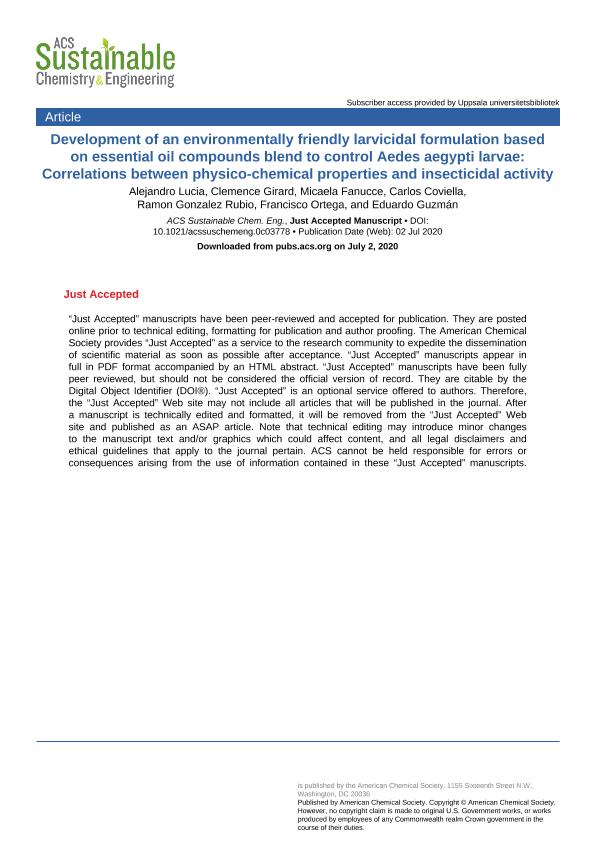Mostrar el registro sencillo del ítem
dc.contributor.author
Lucia, Alejandro

dc.contributor.author
Girard, Clemence
dc.contributor.author
Fanucce, Micaela

dc.contributor.author
Coviella, Carlos Eduardo

dc.contributor.author
Rubio, Ramón G.

dc.contributor.author
Ortega, Francisco
dc.contributor.author
Guzmán, Eduardo
dc.date.available
2022-11-24T18:07:44Z
dc.date.issued
2020-07
dc.identifier.citation
Lucia, Alejandro; Girard, Clemence; Fanucce, Micaela; Coviella, Carlos Eduardo; Rubio, Ramón G.; et al.; Development of an Environmentally Friendly Larvicidal Formulation Based on Essential Oil Compound Blend to Control Aedes aegypti Larvae: Correlations between Physicochemical Properties and Insecticidal Activity; American Chemical Society; ACS Sustainable Chemistry & Engineering; 8; 7-2020; 10995-11006
dc.identifier.issn
2168-0485
dc.identifier.uri
http://hdl.handle.net/11336/178874
dc.description.abstract
Oil in water (o/w) emulsions stabilized by an amphiphilic copolymer have been studied in relation to their potential insecticidal activity against Aedes aegypti mosquito larvae. These emulsions contain as oil phase different blends of two isomeric essential oil compounds, thymol and carvacrol. The results show that the addition of carvacrol facilitates the dispersion of the oil within the aqueous phase, with the stabilization and polydispersity of the emulsions being controlled by the change of the ratio between the copolymer concentration and that of the oil phase (Rcop/EOC). Emulsions containing pure essential oil compounds as oil phase do not present any significant difference on their larvicidal activity against mosquito larvae, with emulsions containing only thymol being slightly more effective than those containing only carvacrol as oil phase. Furthermore, the use of blendscontaining different weight fractions of thymol and carvacrol as oil phase results in formulations with an additive larvicidal activity in relation to those with the pure compounds. Despite the larvicidal activity of the emulsions, they do not provoke inhibition to the emergence of adult individuals in Aedes aegypti populations. The spreading and evaporation of the emulsions onto solid surface, which may be an important parameter for the performance of larvicidal formulations, was found to be dependent on the same parameters that govern the stability of the emulsions. This study helps on seeking new alternatives for the preparation of new eco-sustainable formulations against insect pest.
dc.format
application/pdf
dc.language.iso
eng
dc.publisher
American Chemical Society

dc.rights
info:eu-repo/semantics/openAccess
dc.rights.uri
https://creativecommons.org/licenses/by-nc-sa/2.5/ar/
dc.subject
THYMOL
dc.subject
CARVACROL
dc.subject
NANOEMULSION
dc.subject
AEDES AEGYPTI
dc.subject.classification
Química Coloidal

dc.subject.classification
Ciencias Químicas

dc.subject.classification
CIENCIAS NATURALES Y EXACTAS

dc.title
Development of an Environmentally Friendly Larvicidal Formulation Based on Essential Oil Compound Blend to Control Aedes aegypti Larvae: Correlations between Physicochemical Properties and Insecticidal Activity
dc.type
info:eu-repo/semantics/article
dc.type
info:ar-repo/semantics/artículo
dc.type
info:eu-repo/semantics/publishedVersion
dc.date.updated
2021-04-28T21:34:16Z
dc.journal.number
8
dc.journal.pagination
10995-11006
dc.journal.pais
Estados Unidos

dc.journal.ciudad
Washington
dc.description.fil
Fil: Lucia, Alejandro. Universidad Nacional de Luján. Instituto de Ecología y Desarrollo Sustentable. Consejo Nacional de Investigaciones Científicas y Técnicas. Oficina de Coordinación Administrativa Parque Centenario. Instituto de Ecología y Desarrollo Sustentable; Argentina. Universidad Nacional de La Plata. Facultad de Ciencias Agrarias y Forestales. Centro de Investigación de Sanidad Vegetal; Argentina
dc.description.fil
Fil: Girard, Clemence. École Nationale Supérieure de Chimie de Lille; Francia
dc.description.fil
Fil: Fanucce, Micaela. Ministerio de Salud de la Nación; Argentina
dc.description.fil
Fil: Coviella, Carlos Eduardo. Universidad Nacional de Luján. Instituto de Ecología y Desarrollo Sustentable. Consejo Nacional de Investigaciones Científicas y Técnicas. Oficina de Coordinación Administrativa Parque Centenario. Instituto de Ecología y Desarrollo Sustentable; Argentina
dc.description.fil
Fil: Rubio, Ramón G.. Universidad Complutense de Madrid. Facultad de Ciencias Químicas; España
dc.description.fil
Fil: Ortega, Francisco. Universidad Complutense de Madrid. Facultad de Ciencias Químicas; España
dc.description.fil
Fil: Guzmán, Eduardo. Universidad Complutense de Madrid. Facultad de Ciencias Químicas; España
dc.journal.title
ACS Sustainable Chemistry & Engineering
dc.relation.alternativeid
info:eu-repo/semantics/altIdentifier/url/https://pubs.acs.org/doi/10.1021/acssuschemeng.0c03778
Archivos asociados
